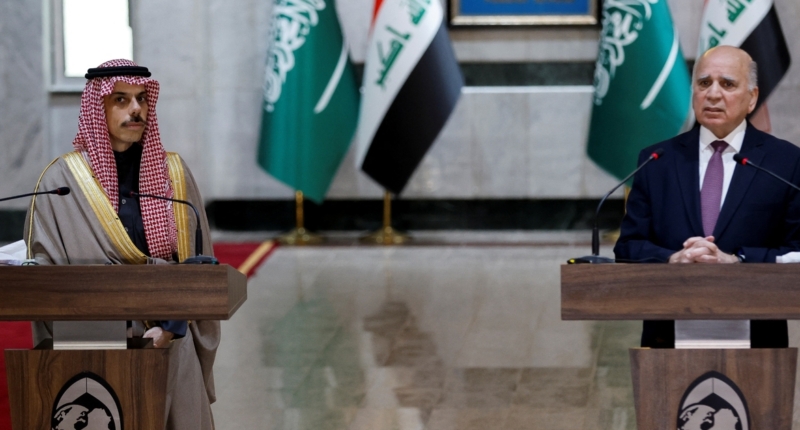Saudi and Emirati-led efforts to reintegrate Iraq with the wider Arab world have been unsuccessful in halting Tehran’s influence. Iraq’s constant shift in prime ministers creates a challenge for the country’s role in the region. Naufel Alhassan, who served as chief of staff and senior adviser to former Prime Minister Haider al-Abadi, stated that Iraq’s ability to succeed internally and provide internal peace will determine its role in the region and the world. Many experts doubt that modern-day Iraq could re-establish itself as a leading Arab power if the state remains highly dysfunctional and under so much Iranian influence. The Iraqi propensity to distinguish itself from Arab Gulf monarchies has not abated to anything more than wishful but wholly unrealistic intentions. The Iranian influence is still prevalent and will continue indefinitely, which means that the diplomatic dance will most probably crash.
Iran’s Dominance in Iraq’s Politics
In the aftermath of the US and UK’s 2003 invasion of Iraq, Saudi officials expressed their concerns to the Bush administration that such an action would create more problems than it would solve. Since then, Iran has emerged as the most influential regional actor in Iraq. Even though ties between Iraq and the Gulf Arab monarchies have improved, Iran’s influence ultimately prevents Iraq’s Arab reintegration.
Factors Contributing to Iran’s Influence
Several factors have contributed to Iran’s high levels of influence in Iraq. One of these factors is Iraq’s demographics and divisions. Iraq is not a liberal democracy, but it is a democracy of sorts, and it represents the interests of the majority of the people in the country. The religious conservative part of Shia Iraq has always been susceptible to Iranian influence, though not all Shia are pro-Iran.
Another factor is the Iranian inroads into the Iraqi economy’s major sectors, such as oil, while also gaining high levels of influence over the security institutions and military. Some of the brigades of the paramilitary Popular Mobilisation Forces (PMFs) have direct links to Tehran. Much of it has to do with the fact that the border between Iraq and Iran is very porous, and Iraqi forces don’t make any effort, nor do they have any capacity, to control the border effectively.
Saudi Arabia’s Engagement with Iraq
In the aftermath of Saddam’s demise, Saudi Arabia and other GCC capitals perceived Iraq under a Shia-led government as “lost” to Tehran. However, beginning in 2015, Riyadh began engaging Baghdad after spending years trying to isolate Iraq. The Saudis appointed an ambassador to Iraq for the first time since 1990, and between 2017 and 2019, Riyadh’s top diplomat visited Baghdad, and the Saudis opened diplomatic missions in Baghdad and Basra. By 2020, the Arar border crossing was reopened following its three-decade closure, and the UAE took steps to start a new chapter in its relationship with Baghdad.
Conclusion
Despite the warming of ties between Iraq and the Gulf Arab monarchies, Iran’s dominance in Iraq’s politics remains unchallenged. Iraq’s porous borders with Iran and Iran’s high levels of influence over Iraq’s security institutions and military have ensured that Iran’s influence will remain a major factor in Iraq’s political landscape.
Iraq’s Relations with GCC States
Efforts by Gulf Cooperation Council (GCC) states to deepen cooperation with Iraq and bring it back to the Arab fold have been largely unsuccessful in halting Tehran’s influence. According to Barbara Slavin, a distinguished fellow at the Stimson Center in Washington, DC, the results have been “decidedly mixed.”
Mixed Results
Slavin stated that the project had more enthusiasm when Mustafa al-Kadhimi was Iraq’s prime minister. Supporters of Moqtada al-Sadr, who positioned himself as an Iraqi nationalist, had emerged as the biggest block in parliament, but were unable to form a government. Imad Harb, director of research and analysis at the Arab Center in Washington, DC, has a similar assessment to Slavin, with Baghdad’s relationships with GCC states thus far not proving fruitful despite intentions.
Lack of Coherent Strategy
Analysts say that a major issue pertains to Arab states lacking a coherent strategy for luring Baghdad away from Tehran. Despite some efforts to use logistics and infrastructure development to secure the GCC members more influence in Iraq by creating co-dependencies, there have been few results. Such projects are not tied to any roadmap, and “very little that’s tangible has happened from the Gulf side in terms of turning Iraq around,” said Andreas Krieg, an associate professor at the Defence Studies Department of King’s College London.
Political Instability in Iraq
Most GCC states view Prime Minister Mohammed Shia al-Sudani and his constituencies as excessively close to Iran, according to Kreig. “The Gulf has really put all collaboration for the time being on ice, which has undermined some of the progress that might have been made under the previous Prime Minister al-Kadhimi, who was seen as being more pro-Arab, pro-Gulf, and more critical of Iran. But obviously, he lost,” explained Krieg. “There will be elections soon again. That might bring al-Kadhimi back. But we don’t know that. The problem is there’s an unstable political regime in Iraq that keeps pivoting from one side to the other depending on who’s in office.”
Hope for the Future
It is hoped that the latest agreement between Saudi Arabia and Iran will reflect positively on Iraq-GCC relations. Iraq has good relations with Syria and Lebanon and has developed what can be seen as strategic economic relations with Jordan and Egypt that promise to help the three countries’ economic standing. In the end, a major determining factor in all of this is the position of Iran-friendly political forces in Iraq, thus the importance of the latest Saudi-Iran agreement.
Iraq’s Role in the Region
According to Andreas Krieg, an associate professor at the Defence Studies Department of King’s College London, Iraq’s constant shift in prime ministers creates a challenge for the country’s role in the region. Naufel Alhassan, who served as chief of staff and senior adviser to former Prime Minister Haider al-Abadi, stated that Iraq’s ability to succeed internally and provide internal peace will determine its role in the region and the world.
Doubts on Iraq’s Re-establishment as an Arab Power
Many experts doubt that modern-day Iraq could re-establish itself as a leading Arab power if the state remains highly dysfunctional and under so much Iranian influence. Joseph A Kechichian, a senior fellow at the King Faisal Centre in Riyadh, argues that Saudi and Emirati-led efforts to reintegrate Iraq with the wider Arab world will be unsuccessful. “The Iranian influence is still prevalent and will continue sine die [indefinitely], and the Iraqi propensity to distinguish itself from Arab Gulf monarchies has not abated to anything more than wishful but wholly unrealistic intentions,” said Kechichian.
Don’t miss interesting posts on Famousbio









